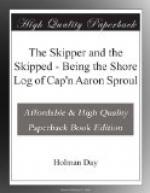During many hours of the day Mr. Tate did not write, but sat and gazed at the cracked ceiling with a rapt expression that made the Cap’n nervous. The Cap’n spoke of this to Hiram.
“That feller ain’t right in his head,” said the selectman. “He sets there hours at a time, like a hen squattin’ on duck-eggs, lookin’ up cross-eyed. I was through an insane horsepittle once, and they had patients there just like that. I’d just as soon have a bullhead snake in the room with me.”
“He’s gettin’ up his pome, that’s all,” Hiram explained. “I’ve seen lit’ry folks in my time. They act queer, but there ain’t any harm in ’em.”
“That may be,” allowed the Cap’n, “but I shall be almighty glad when this centennial is over and I can get Pote Tate out of that corner, and put the broom and poker back there, and have something sensible to look at.”
Preparations for the great event went on smartly. The various societies and interests conferred amicably, and the whole centennial day was blocked out, from the hundred guns at early dawn to the last sputter of the fireworks at midnight. And everything and every one called for money; money for prizes, for souvenirs for entertainment of visitors, for bands, for carriages—a multitude of items, all to be settled for when the great event was over. If Cap’n Sproul had hoped to save a remnant of his treasure-fund he was soon undeceived. Perspiring over his figures, he discovered that there wouldn’t be enough if all demands were met. But he continued grimly to apportion.
One day he woke the poet out of the trance into which he had fallen after delivering to his chairman a great pile of sealed letters to be counted for stamps.
“What do I understand by all these bushels of epistles to the Galatians that you’ve been sluicin’ out?” he demanded. “Who be they, and what are you writin’ to ’em for? I’ve been lookin’ over the names that you’ve backed on these envelopes, and there isn’t one of ’em I ever heard tell of, nor see the sense in writin’ to.”
Mr. Tate untangled his twisted legs and came over to the table, quivering in his emotion.
“Never heard of them? Never heard of them?” he repeated, gulping his amazement. He shuffled the letters to and fro, tapping his thin finger on the superscriptions. “Oh, you must be joking, Captain Sproul, dear sir! Never heard of the poets and orators and savants whose names are written there? Surely, ’tis a joke.”
“I ain’t feelin’ in no very great humorous state of mind these days,” returned the Cap’n with vigor. “If you see any joke in what I’m sayin’ you’d better not laugh. I tell ye, I never heard of ’em! Now you answer my question.”
“Why, they are great poets, authors, orators—the great minds of the country. They—”
“Well, they ain’t all mind, be they? They’re hearty eaters, ain’t they? They’ll want three square meals when they get here, won’t they? What I want to know now is, how many thousands of them blasted grasshoppers you’ve gone to work and managed to tole in here to be fed? I’m just wakin’ up to the resks we’re runnin’, and it makes me sweat cold water.” He glanced apprehensively at the papers bearing his computations.




